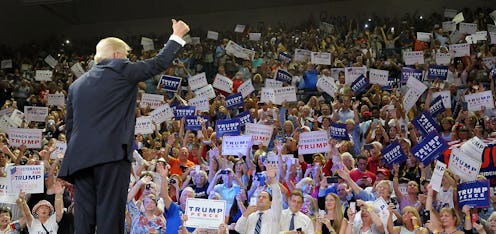News
The Scary Part Of Trump's Speech We're Ignoring
You've likely heard Donald Trump's now infamous quote from a North Carolina rally on Tuesday that seemed aimed at enlisting Second Amendment supporters to assassinate Hillary Clinton: "If she gets to pick her judges, nothing you can do, folks ... Although the Second Amendment people — maybe there is, I don’t know." And in the echo chamber of the 24-hour news cycle, we've mostly only heard that chunk of his speech. However, what Trump goes on to say is what's really indicative of his true intentions and what is actually the scariest:
Hillary essentially wants to abolish the Second Amendment. Now, speaking to the NRA folks ... either you’re not going to have a Second Amendment or you’re not going to have much of it left. And you’re not going to be able to protect yourself, which you need ... No, no, not going to happen, we can’t let it happen. We can’t let it happen.
The high-pitched dog whistles are nearly out of auditory range, but if you listen closely, you can hear why what he said is especially dangerous. This kind of remark isn't something that's new. His comments are invoking the inflammatory language that Freedom Caucus Republicans, the group of conservatives who, among other things, has been resistant to legislation that would block suspected terrorists from buying guns, has leaned on in the past.
To further illustrate the point, in 2010, Sharron Angle, a Tea Party Republican from Nevada who challenged Sen. Harry Reid for his seat, said something awfully similar to Trump's threat of not being able to "protect yourself." Specifically, Angle said during a radio interview with Bill Manders, "When you read that Constitution and the founding fathers, they intended this to stop tyranny. It’s to defend ourselves. And you know, I’m hoping that we’re not getting to Second Amendment remedies." Second Amendment remedies? So ... shooting people.
Angle's not the only one. In the same year, Sarah Palin used crosshairs on a map to "target" people who voted for healthcare reform. One of those people was Arizona Rep. Gabrielle Giffords. In tandem, Jesse Kelly, Republican opponent to Giffords held an event at a local gun range encouraging supporters to, "Get on Target for Victory in November. Help remove Gabrielle Giffords from office. Shoot a fully automatic M16 with Jesse Kelly." Roughly seven months later, Giffords was shot in the head at an event in her home state and suffered nearly-fatal wounds from which she remains severely impaired today.
The words political figures use surrounding guns and political action have real-life and sometimes grave consequences. And it's not exclusive to 2010 — the words that Trump uses at rallies may be already having violent repercussions. In an article that cited multiple outbreaks of violent behavior at Trump rallies, including one where attendees showed up with riot-gear shield and guns, Bloomberg's Kevin Cirilli wrote:
The violence and angry rhetoric at Trump's well attended rallies has not abated since the billionaire became the presumptive Republican presidential nominee. In part, that's because the candidate continues to rev up his most ardent supporters and taunt his foes at a time when he desperately needs to appeal to independent and moderate voters.
Trump's sound byte-sized assassination insinuation against Clinton is remarkably scary and outrageous. But let's not forget the other frightening rhetoric he said on Tuesday and the violence that he's implicitly and explicitly encouraged throughout his campaign.
